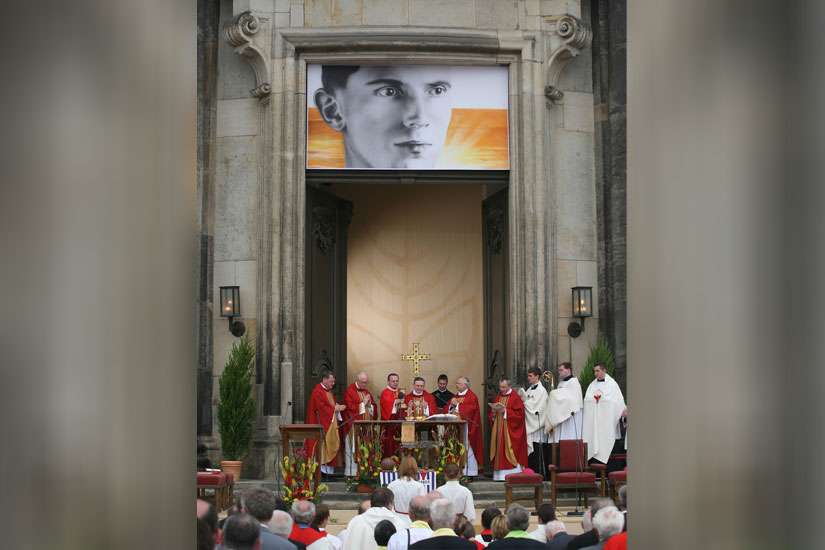"Dachau was the main camp for priests from all over Europe, and over half came from Poland," said Msgr. Jozef Kloch, spokesman for the Polish bishops' conference.
"We want to highlight this as we remember the camp's liberation by the U.S. Army, paying tribute to those who died, as well as to their spiritual achievements in such appalling conditions," he explained.
Msgr. Kloch spoke as plans were underway for the April 29 observance of the 70th anniversary of Dachau's liberation by Allied forces. About 800 priests and 30 bishops from Poland were expected to attend the event near Munich in southern Germany.
Many priests who survived Dachau has been harassed as suspected American spies by the secret police when they returned home after the war to communist-ruled Poland, Msgr. Kloch told Catholic News Service.
Despite the sufferings of the Polish clergy, their story remained little known and Msgr. Kloch said he was shocked to discover that virtually all of Dachau's buildings had since been demolished.
"Unlike at Auschwitz, where much still remains, there's now hardly any trace of Dachau at all. It's as if history itself has been erased there," he said.
"This anniversary should remind the world of the terrible thing which war is, and draw attention to the fate of the many clergy who died in camps like this."
Poles, a third of them Jews, made up more than 60 percent of the 200,000 inmates at Dachau and about 20 percent of the 149,000 people who died there in the 11 years the Nazis operated the camp.
Polish priests comprised 1,777 of the 2,794 priests imprisoned at the camp, and 868 or the 1,034 who died, mostly from physical mistreatment.
A total of 46 Polish clergy victims of Dachau were beatified as martyrs by St John Paul II in 1999. Auxiliary Bishop Michal Kozal, who was executed by an injection of carbolic acid in 1943, was declared blessed in 1987.
The anniversary events will include Mass at the camp April 29 concelebrated Cardinal Reinhard Marx of Munich-Freising and Archbishop Stanislaw Gadecki of Poznan, Poland, presidents of their respective bishops' conferences. An ecumenical service with Catholic, Protestant and Orthodox leaders is planned for May 3.
Addressing a Warsaw conference April 15, Anna Jagodzinska, of Poland's Institute of National Remembrance, said the Nazis had planned to eliminate Poland's Catholic clergy as a "barrier to Germanization," while Poland's later communist government had prohibited any acknowledgement of "clergy wartime martyrs" to aid its campaign against the church.
Meanwhile, another Polish World War II history expert said he believed the fate of priests at Dachau was "insufficiently known," and that only a small memorial had been installed on a nearby hill known as Leitenberg, where 7,400 camp victims were buried after the war.
"It's scandalous the largest national group imprisoned at Dachau is being forgotten," Piotr Maloszewski, chairman of the Polish Pastoral Council in Western Europe, told Poland's Catholic information agency, KAI, April 23.
"Our consulate in Munich has also tried for years to arrange for a memorial in Polish alongside the existing tablets in five languages. Although the camp museum favours our idea, the International Dachau Committee hasn't agreed," he said.
Msgr. Kloch said a joint working group of the Polish and German bishops has met regularly to discuss cooperation and that church leaders in both countries had staged joint events in an effort to build closer links.
"The German church is aware of the terrible things done to Poles by German soldiers during World War II. Our contacts are now very close," he said.
"It's not always known that the imprisoned clergy could have left Dachau at any moment as free men, on condition they resign their priesthood and declare themselves supporters of the German Reich. None of them did so and this is why they suffered."


